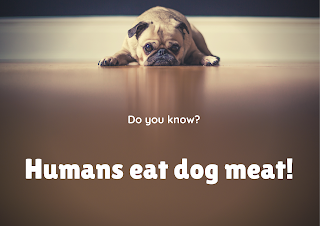Do You Eat Dog Meat?
Around early 2022, I watched a video of a big dog being forced by a man to go up to a truck. The man was apparently a dog meat trader in a certain part of China. He was using a sharp tool to grip the dog’s neck, which obviously caused it pain and made it fearful as could be seen from its expression. There were other dogs on the truck. It was a sad sight to behold.
There were quite a lot of onlookers around. I was shocked that none of them intervened. I knew it could get them into trouble with the dog meat trader if they were to intervene. But if some of them had stepped forward to help the poor dog, it was very likely to be saved. Surely they could buy it or at least call an animal shelter? How could they be so indifferent to the way the dog meat trader handle it?
Dogs aren’t poultry. They are supposed to be pets doted by humans, not killed and eaten as food, isn’t it? Moreover, dogs are said to be very loyal. So how could anyone have the heart to kill and consume them? Of course I know in some cultures, it’s an acceptable practice. But honestly I think it’s unacceptable. And I can’t imagine myself eating dog meat!
I believe there’s a humane way to kill animals for consumption. But from what I’ve read online, it seems that those who sell dog meat aren’t killing dogs in a humane way. For instance, I’ve read of dogs being boiled alive before they’re served as food for humans! (Warning: Extremely graphic content at https://www.mirror.co.uk/news/world-news/defenceless-dogs-scream-agony-boiled-8788111)
To me, this is just too evil, especially in the context of the 21st century. We aren’t living in ancient times! So how could humans be so barbaric today?!
Is there a Humane Way to Kill an Animal for Consumption?
Like I’ve said, I believe there’s a humane way to kill animals. So what is humane slaughter? To me, humane slaughter means that an animal is killed in the fastest and the least painful way. According to https://kb.rspca.org.au, humane slaughter means that "an animal is either killed instantly or rendered insensible until death ensues, without pain, suffering or distress".
Ideally in my opinion, the practice of humane slaughter should take the following into consideration: (1) Allow the animals to have their last meals before they’re slaughtered and (2) Ensure that the animals aren't subject to any stress or fear prior to slaughter. For instance, they shouldn’t be made to witness the slaughter of other animals, which would certainly cause them stress and fear.
Of course I understand that it might be inevitable if there are space and manpower constraints. But I believe that owners of slaughterhouses and their workers could resolve this issue with relative ease if they care enough about humane slaughter.
I understand that in the context of business, profits are important. And if the slaughterhouses are going to employ additional staff and rent an additional space to hold the animals which are waiting to be slaughtered, it just doesn't make business sense. But I believe that slaughterhouses that practise humane slaughtering of animals will stand to gain in the long run.
Incidentally in the United States, inhumane slaughter became illegal when the Humane Slaughter Act came into effect in 1958, and it was to prevent the unnecessary suffering of animals during slaughter. (https://modernfarmer.com/2013/04/this-is-what-humane-slaughter-looks-like-is-it-good-enough/)
The Origins of Dog Meat Trade
The origins of dog meat trade are unclear, but it’s believed to have been practised in various cultures throughout history. There was evidence of dog meat consumption dating back to ancient times in some parts of the world, including China, Korea, India and Mexico. (https://en.wikipedia.org/wiki/Dog_meat) So dog meat trade could have started around the same time.
Why Do People Eat Dog Meat?
Dog meat is said to be an emergency food source in times of war. It’s said that dog meat has medicinal properties. And it’s believed to raise body temperature and therefore promote warmth during winter. (https://www.caninebible.com/why-do-chinese-eat-dogs/)
Where in the World Do People Still Eat Dog Meat?
People are still consuming dog meat in different parts of the world today. But it’s apparently in Asia that dog meat consumption is the most widespread. And it’s said to be the most common in China, Indonesia, Vietnam, South Korea, the Phillippines, Cambodia, Thailand and Laos. (https://worldpopulationreview.com/country-rankings/what-countries-eat-dogs)
Yulin Dog Meat Festival
An apparently well-known festival, known as the Yulin Dog Meat Festival, began over a decade ago in Guangxi, China. It's an annual event, attracting thousands of people from different parts of China. (https://www.newsweek.com/yulin-dog-meat-festival-pictures-heartbreaking-cruelty-1715153)
Many of the dogs whose meat is sold at the festival are apparently pets that have been stolen. In a video that I'd watched, a man in a certain part of China could be seen 'luring' a 10-month old puppy that was outside its house with some kind of treat that was apparently poisoned or something. The puppy lost consciousness soon after tasting it. In the end, it lost its life. (https://www.newsweek.com/horror-yulin-dog-meat-festival-exposed-thousands-set-slaughter-1717427)
Where in the World is the Consumption of Dog Meat Legal?
Dog meat consumption is legal in the following countries:
(1) Cambodia (except in Siem Reap);
(2) Cameroon;
(3) Central African Republic;
(4) China*;
(5) The Democratic Republic of Congo;
(6) Indonesia#;
(7) Liberia;
(8) Nigeria;
(9) North Korea;
(10) South Korea*;
(11) Timor Leste;
(12) Uzbekistan; and
(13) Vietnam.
(Note that * means decreasing in popularity while # means it's practised by minority). (https://worldpopulationreview.com/country-rankings/what-countries-eat-dogs)
1. Nagaland, India: Nagaland, a north-eastern state in India, has banned the import, trade and sale of dog meat, apparently after a sustained campaign by animal welfare groups. (https://www.bbc.co.uk/news/world-asia-india-53288214)
2. Siem Reap, Cambodia: Siem Reap has banned the sale and consumption of dog meat. Those who are guilty of violations will face fines or imprisonment. (https://www.bbc.co.uk/news/world-asia-53334854)
3. Taiwan: In 2017, Taiwan became the first Asian country to ban the consumption of dog (and cat) meat, imposing fines and potential imprisonment for violations. (https://www.nationalgeographic.co.uk/animals/2018/02/dog-meats-controversial-history-from-the-ancients-to-the-winter-olympics)
4. Philippines: In 1998, the Animal Welfare Act was enforced in the Philippines, prohibiting the killing of dogs/cats (for their meat), as well as prohibiting the sale and trade of dog (and cat) meat. (https://awionline.org/awi-quarterly/2013-summer/awi-investigates-illegal-dog-meat-trade-philippines-and-thailand)
5. Thailand: In Thailand, the trading and consumption of dog (and cat) meat is illegal under the Cruelty Prevention and Welfare of Animal Act B.E. 2557 (2014). (https://en.wikipedia.org/wiki/Animal_welfare_in_Thailand)
6. North Sulawesi, Indonesia: On Friday (21 Jul 2023), the officials in the province of North Sulawesi banned dog (and cat) meat trade in an infamous Indonesian market.(https://www.straitstimes.com/asia/se-asia/indonesia-s-north-sulawesi-bans-infamous-dog-and-cat-meat-trade)
7. Shenzhen, China: On 1 May 2020, Shenzhen passed a law banning the sale and consumption of dog (and cat) meat, making it the first city in China to do so. The ban was part of its food safety legislation. (https://www.newsweek.com/chinese-city-bans-eating-cats-dogs-coronavirus-wildlife-meat-1495817#%20-%20Shenzhen%20was%20the%201st%20city%20in%20China%20to%20ban%20the%20sale%20&%20consumption%20of%20dog%20meat)
Please note that the above isn't an exhaustive list. There could be other countries/provinces/states/cities that have already banned the sale and/or consumption of dog meat.
What Have Been Done/Can Be Done to Prevent the Sale and Consumption of Dog Meat?
1. Public Education on Responsible Pet Ownership
I'd watched videos showing dog owners in China selling their dogs to dog meat traders when they were about to move to other cities or when they no longer wanted the dogs due to whatever reasons. To me, such people are irresponsible and evil. Don't they have any feelings for the dogs that used to be their pets? Or do they think that dogs are just their disposable toys?
I've joined some animal-related Facebook groups, including lost pets groups. And to be honest, I must say that I was initially shocked to keep reading about lost pets. I often wonder why. Why are there so many lost pets? Why aren't owners more careful when walking their dogs? Why don't they leash their dogs when they're outside? Why do they allow their dogs to roam? I understand that sometimes things just happen. And I'm not trying to criticise or judge them. But I believe that they could take more precautions for the sake of their dogs.
There are owners who abandon their pets due to various reasons. In some cases, it could due to a sudden change in their financial situations. In other cases, it could be due to relocation. Yet in other cases, it could be due to owners' failing health.
But whatever the reasons may be, I think it's very irresponsible and evil to abandon one's pet. Aren't those who abandon their pets aware that the latter could end up as food for human consumption? This isn't impossible, especially in places where the consumption of dog meat isn't frowned upon. At the very least, if you're no longer able to keep your pets, you should and could get in touch with an animal shelter.
In short, I'd say that educating the public on responsible pet ownership is important in the fight against dog meat trade and consumption, regardless of whose responsibility that is.
2. Legislation to Ban Dog Meat Trade and Consumption of Dog Meat
Some countries have already implemented laws and regulations to prohibit the sale and/or consumption of dog meat, as mentioned above. But in my opinion, a lot more can be done to advocate for legislation across the world, given that there are still many countries that apparently don't have such laws in place.
Additionally, the authorities must be proactive in enforcing these laws because laws that aren't enforced are useless. What we individually can do is to report any suspected dog meat eaters/traders in our own communities and let the authorities investigate such cases. It's going to be a long and arduous road. Nonetheless, we'll get there eventually if we play our part.
3. Campaign to Raise Awareness About the Dog Meat Trade
Currently there are international organisations (for example, Humane Society International (HSI)) and animal rights groups that are actively working to raise awareness about the ethical concerns of the dog meat trade and promote alternatives to this trade. (https://blog.humanesociety.org/2022/12/how-we-kept-fighting-to-save-dogs-and-end-the-dog-meat-trade-in-2022.html)
Organisations, such as HSI, work across borders to stop the dog meat trade. HSI collaborates with governments, local organisations and communities to raise awareness about the trade and provide support for alternatives to the trade. (https://en.wikipedia.org/wiki/Humane_Society_International)
4. Advocacy and Lobbying
Animal welfare organisations and international organisations have worked to influence lawmakers to enact laws and regulations that prohibit the sale and consumption of dog meat. They've also advocated for stricter enforcement of existing laws. (https://www.diva-portal.org/smash/get/diva2:1483667/FULLTEXT01.pdf; https://blog.humanesociety.org/2022/12/how-we-kept-fighting-to-save-dogs-and-end-the-dog-meat-trade-in-2022.html)
5. Change in Public Opinion and Cultural Shifts
Public opinion plays a crucial role in driving change. There's a growing movement against dog meat consumption across different parts of the world with more people expressing opposition to the practice. Increased awareness about animal welfare and changing cultural attitudes have contributed to a decline in demand for dog meat. (https://www.prindleinstitute.org/2021/10/in-defense-of-eating-dogs/)
We can shape public opinion pertaining to dog meat consumption and trade by what we share and how we share it. Don't underestimate the power of your words.
Conclusion
The dog meat trade has apparently faced significant criticisms in recent years due to concerns related to animal welfare, public health and the potential for illegal activities such as theft and smuggling of pet dogs. (https://edition.cnn.com/2013/06/02/world/asia/thailand-dogs/index.html; https://www.scmp.com/lifestyle/health-wellness/article/2151975/asias-booming-dog-meat-business-and-activists-seeking-end )
We’ve a duty to speak out against this heinous trade and take action against those who perpetuate it, because dogs have no voice of their own and they depend on us to speak up for them.
We can do our part by helping to raise awareness about this brutal and unethical trade, supporting animal welfare organisations and advocating for stricter laws and regulations pertaining to animals and animal welfare, thus making a difference in the lives of countless dogs. Let's do our part to put an end to the dog meat trade once and for all.
Cheers,
Annie Chan
(P/s: My next blog post will be published on 24 Sep 2023.)
NOTES
1. Check out my website:
https://www.elevatewellnesscircle.com/
2. Check out my affiliate programme:
https://www.elevatewellnesscircle.com/affiliate
3. Try for FREE: power recharge therapy, power foot detox therapy & acugraph energy analysis! (https://energia.sg/free?ref=anniechan)













